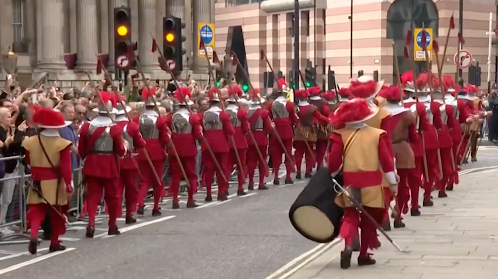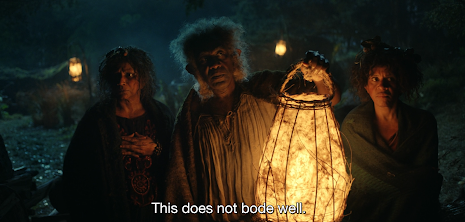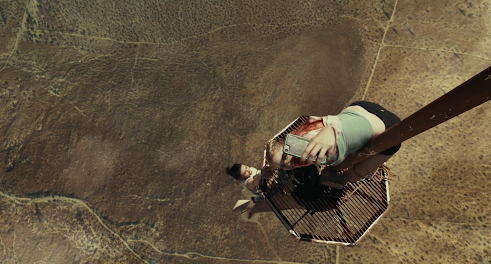Wednesday, September 28, 2022
Mila
It's the F what I'm afraid of for...
An utterly unprecedented intervention today in UK fiscal policy by the IMF...
Belizeans — on their own for 41 years now — have had ample time to learn the meaning of the last letter of that acronym!
Many-sided
Been thinking a bit about our apparently insane new government in the UK.
Graham Greene famously observed that "sooner or later, one has to take sides".
I have a good sense of what he meant, and it was not a reference to the kind of decisions one takes at the roulette table.
Nor really was he referring to the political choices we make or reaffirm every time an election comes around. Or indeed the sides apparently just chosen by the Tory membership.
For Truss and her team the sides are more like the character classes in D&D, along with their 'alignments'.
I suppose the PM might see herself as "chaotic good" — a gleamy-eyed libertarian like our very own Gloria Álvarez, though less born to it than baaaawn again.
What one makes of all this will kind of depend on one's view on the seventies. (And to think it was Corbyn who we imagined was destined to take us all back there on the nostalgia tour.)
The thing is, the government isn't taking sides, it's just rolling those odd shaped dice, having reflected that if only Tories really ever cared about fiscal responsibility — dutifully making the at-least-partly-false comparison between household and Treasury budgets — why should anyone else really care if they abandon the pretence of being lawful neutral paladins once and for all?
Ya Monnonites
Rupa Huq, a Labour backbencher with some previous in out-group bullying, this week added to the growing body of opinion that black men who stray from the social justice message tend to manifest as alarming white, especially on BBC Radio 4.
She earned herself the sternest ticking off her party leader is currently capable of.
Last week I shared a vehicle with a pair of Mennonites; very large chaps with large beards...
I have to admit that in all these years I had not previously participated in a conversation in English with members of this tribe, and had just assumed that they would sound hilariously Teutonic, rather like Toto Wolff.
Instead, to my astonishment, they expressed themselves in proper Belizean creole.
Anyone who has spent any time in the Caribbean will know that lighter-skinned inhabitants of the region who sound darker in speech are not an especially unusual phenomenon, but Central American Mennonites are undoubtedly at the extreme, non-superficial end of whiteness.
For sure their conversation was predictably focused on farming and the recent weather patterns, yet was enunciated in a manner that shaded these blandly agrarian interests with a disarmingly street patina.
During my rather limited residence in Orange Walk Town in the late 80s, I learned that there appeared to exist two distinct tendencies within the community: the hardcore 'no rubber tyres on our buggies' group and then those equipped with walkie-talkies and cultivating high value export crops for the US market, if you get my drift.
Hulu and Netflix might consider another iteration of their most successful productions; a sort of Narcos/Handmaid's Tale hybrid.
Thursday, September 22, 2022
An eastern view of the western...
* Yes, I do know Joe’s also Catholic, but to the Russians his people are Evangelical first and Jewish second before we even get to that.
Friday, September 16, 2022
"The only restaurant to survive the franchise wars..."
That gag in Demolition Man (1993) possibly needs some tweaking for La Antigua today.
"Now all restaurants in town must serve pizza..."
Post-GOAT
Gentlemen at Arms
As I suggested in the previous post, those who might imagine that what they have been witnessing in London this week is some sort of kooky fancy dress event are, at least partly, getting the wrong end of the stick.
For rather than a costume worn over the skin, the pageantry unleashed by the death of Queen II is an at times a highly unusual glimpse under the skin...of the state, the undoubtedly strange fabric of British history, the public consciousness, etc.
These things are more normally reflected back at us by the mainstream media and formal academic pronouncements, but the ceremony we are now witnessing provides an entirely different and (perhaps counter-intuitively) authentic form of national mediation.
Much of it has been either new to me or stuff I had possibly not really paid attention to before.
Take these chaps: the Honourable Corps (formerly band) of Gentlemen at Arms with their swan-feather plumes. Just some old establishment dodderers kitted out by Gieves & Hawkes of Savile Row, you might conclude, yet their history and presentation is fascinating...
They were first established as the personal bodyguard of the monarch in 1509 (the same year SPS was founded) — in effect Henry VIIIs Praetorian Guard (or for Thronies, his Kingsguard).
At first the band was made up of young cadets from noble families and although they now dress as cavalrymen, for most of the sixteenth century the Gentlemen were a dismounted unit armed with battle-axes. In the course of the Civil War they saved the life of the previous Charles, then Prince of Wales, at the Battle of Edgehill (1642).
Their non-ceremonial functions continued in parallel until the 1840s, when they became permanently 'fixed' in the form of red-coated Dragoon Guards.
Not long afterwards the Russians would have faced similarly-attired men on horses during the Charge of the Heavy Brigade at Balaclava. Frankly, it wasn't much of a charge, barely a trot, as the brigade had to attack uphill, and the whole action lasted ten minutes at most, but was generally more successful than that of Lucan's other brigade at the same battle a little later on.
Anyway, as the need for combat-readiness /taking a bullet for the boss was waived, the age-profile of the Gentlemen shifted to the current average of 52.
Today the Corps consists of 27 Gentlemen plus 5 officers, one of whom is always the Government's Chief Whip in the House of Lords, so a sort of political Kommissar.
Major Walter Clopton Wingfield, pioneer of the game of lawn tennis, served from 1870-1909.
In the middle of the 19th century the sport finally made it out from the enclosed indoor courts of Real Tennis, thanks to the development of bouncy vulcanised rubber balls and the prevalence of under-utilised croquet lawns.
The Major devised the modern scoring system and made a packet selling boxed sets of racquets and balls for between five and ten guineas. He called his new game Sphairistikè which, you will note, did not catch on to quite the same extent.
He was inducted into the International Sphairistikè (tennis) Hall of Fame in 1997.
Monday, September 12, 2022
My Liege...
I've been LOLing away this week at some of the output on Twitter from the nitwits acting like they've just woken up in some terrifying, feudal dystopia.
One British economist in particular only now seems to have shaken off the mind-fog and achieved awareness that he's spent the past six decades living in a constitutional monarchy with 1200 years of history behind it.
In particular he has been getting his knickers in a twist about the term "Liege Lord", which cropped up amongst other medieval flourishes at St James's Palace the other morning.
There are several points worth making here.
If ever you have the misfortune to face the Coldstream Guards in battle they will not be wearing red coats and bearskin hats. Similarly the artillery that we have been sending to Ukraine was not carried there by horses mounted by men who looked ready to give Boney some hell. Most of us can cope with the distinction between actual and ceremonial.
The useful continuity in our mode of government comes without uniform smoothness, reflecting the stream of national events that fashioned it. Call the UK system a Frankenstein's Monster if you must; it certainly appears to possess core parts and appendages that have come from different holes in the historical ground.
Following the death of Elizabeth II, we have had fairly unusual opportunity to see "under the skin" of the state, and any weirdness thus manifested should not necessarily be terrifying. In as much as the late monarch was surely never a flesh-eating lizard in a skinsuit, neither is our system of government, nor semi-independent offshoots like the Corporation of London.
For the protocols and ceremonials of our organic constitution necessarily possess parts that are visibly old as well as more newish, but that has never inferred that the entire system is incapable of modernity.
Indeed, if there is one thing we are seeing in the contemporary world, it is how more apparently modern written constitutions can struggle to adapt to changing circumstances.
And though the Privy Council is a more direct descendant of the Anglo-Saxon Witan than our new King himself is from Alfred the Great, that should not mean, as one commentator has suggested, that there ought to have been a free and open discussion on Charles's fitness to be King in St James's Palace on Saturday. The Proclamation was a formal expression, rather like the language that was used, of something more straightforward. An underlying smoothness beneath the symbolic lumpiness, if you like.
If this were not the case, the contrasting iconography on display outside The Royal Exchange a couple of hours later would have had the potential to be awkwardly discordant. Yet once again, I remain safe in the knowledge that the Lord Mayor doesn't show up to work in that outfit every day, accompanied by Oliver's army.
So let us be done with the pageant paranoia. We are not living in Victoriaworld infiltrated by deferential droids impossible to distinguish from actual human beings.
Perhaps the real problem here is modernity not antiquity. It has encouraged us to become anxious about any disconnect between appearance and reality and that in turn is leading us to be dismissive and occasionally shaken by history itself — for like the very best written stories, it shows rather than tells, forcing us into the grown up world of interpretation.
Sunday, September 11, 2022
Proper Charly
Very much looking forward to the tennis this afternoon. Right on time I have warmed to Carlos Alcaraz Garfia.
Previously I found him rather disconcertingly similar in aspect to a certain kind of rebellious, regional teen familiar from Spanish cinema, neither quite on the right or the wrong side of the tracks and possessed of a large and noisy motorcycle.
Then there was the matter of the slightly mob-like nature of his entourage.
I cheered on his Italian opponent 'Pecador' in the quarters, and his American one in the semis, but along the way acquired a sense of his extraordinary resourcefulness and a combative style that is more than a mere update on that of Nadal.
As for Ruud, for me he still retains an aura of Norwegian blandness which may yet dissipate. It is thrilling to see such a changing of the guard. One is almost inclined to toss one's bearskin in the air and shout "hip hip hooray".
As for newly-crowned US Open champion Iga Swiatek, it's hard not to imagine that she might go on to accumulate more Slams than Serena and indeed, Margaret. The whole GOAT debate is still distorted by the way many of the past candidates either spent too much time in Australia or alternatively avoided it altogether.
If the young Pole can turn up at the business end of the majors at least twice a year for the next decade, do-able I think, then that awkward old record should finally fall.
The Crimean Conundrum
Some will no doubt observe that I would say this, but it seems to me that an oversized proportion of the idiotic comments that crop up within today's public discourse* are delivered, with confidence, by people having a poor knowledge and understanding of history.
170 years ago Britain went to war with Russia in the Crimea. The origins of this conflict are amongst the most deliciously complex in the modern era (more on that 'momentarily', as they say on American airplanes), but a key moment occurred in the lead up when the Tsar made a surprise and secretive visit to London and secured what he believed was a solid understanding with Queen Victoria**.
This mis-apprehension was based on several significant mis-appraisals of how British government institutions (and the native media) actually operate. Alexander just assumed that the monarch had final say in foreign policy, rather like he did.
Seeing simplicity where there is complexity is often a sure path to being perversely wrong.
Some of the motivations for conflict in the 1850s appear recognisable from our own geopolitical milieu, yet they seem to have been accumulating and interacting in often strikingly unfamiliar ways.
There was religion — Christianity split between its eastern and western denominations with some epic clerical brawls breaking out in the Holy Land, plus Islam, both established and Jihadi — commercial interests, large and small scale nationalism (conservative and radical), naval posturing, ethnic cleansing, strategic concerns about zones of influence and civilisational balance, deluded attempts to re-enact the semi-mythological past, distrust of the French, sympathy for the plight of the Poles, Pan-Slavism and Russophobia...to name but the most salient elements.
Overall one could say it's an even bigger mélange than the one which would later take shape prior to 1914.
History is to some extent always like this, yet sadly it will not stop people profering infantile one-dimensional explanations for major events. You will be aware of the kind of thing I mean. "Putin was provoked by NATO...The Iraq War was all about greed..." and so on.
And these mis-conceptions about how things start lead to problems later on when they apparently end. The over-simplistic idea that Germany alone had started WWI led to a post-armistice settlement which contributed to the next big morass of ruinous collisions in the 1930s.
History, just like physics, has its cats suspended in a state of confounding ambiguity.
I recently came across a description of of the Johnson premiership as “an unsustainable mass of painful paradoxes” and this struck me as a decent enough working description of the driving forces behind much of what we call world events.
* Thanks to social media these are more obvious than ever, and owing to the death of Queen Elizabeth we have just experienced a bit of a squall.
** The manner that these encounters have a consistent tendency to lead to a later gathering of misunderstandings, did not stop Peres and Arafat meeting in similar clandestine circumstances at my Aunty's house outside London.
The Proclaimers
Tickler and Teazer
Today Belize has celebrated with parades and parties its defining Battle of St George's Caye (1798), the seventh and last time the settlers fought off an attempt by the Spanish crown to expel them from the Central American mainland.
It went on for a week, with the enemy attempting to force their way through one of the main channels leading through the barrier reef alongside Montego Caye.
The key moment occurred after 1pm on September 10 when a not-so-grand armada from the Yucatán commanded by Irish-born Don Arturo O'Neill Tirone lined up in the standard fashion — at least until Nelson would change the rules 7 years later at Trafalgar — alongside the hastily-assembled fleet of the defenders, assisted by three British ships from Jamaica: Merlin, Teazer and Tickler. (There was also a schooner called Swinger.)
The Superintendant of Belize, Lt Colonel Thomas Barrow, had been impatient to move the battle to the "land phase", but Merlin's commander John Moss spotted the opportunity to rout the Spanish at sea.
Crucial decisions had also been taken in July, such as the arming of the loggers' slaves, many of whom appeared to have a handy understanding of West African ways of warfare, and not evacuating the settlement over-hastily.
The British had long considered it a bit of a liability, its inhabitants too unruly to manage, and another 64 years would pass after the battle before Belize would formally join the Empire as British Honduras.
Yet war between Britain and Spain was effectively ended for a while by the treaty of Versailles in 1783, which re-established the previously-agreed logging rights of the Baymen. (Though peacetime might not have pleased the buccaneers quite so much.)
New York explorer-lawyer John L. Stephens visited "Balize" in October 1839, then home to some 6000 people, and confessed that he "knew not whether to be shocked or amused" by the racial diversity evident at the higher end of society...
Before I had been an hour in Balize I learned that the great work of practical amalgamation, the subject of so much angry controversy in the States, had been going on quietly for generations; that colour was considered mere matter of taste.
When I first came to Belize myself, I visited St George's Caye, then operating as a kind of Club Med facility for British service personnel, offering windsurfing and other entertainments. (The resort has since shifted into the private sector.)
In five days time Guatemala will celebrate its Independence Day, an event, it must be said, significantly facilitated by Admiral Lord Nelson's celebrated victory at Trafalgar, which left Spain's American colonies effectively cut off from the interference of their European masters, who found themselves suddenly bereft of a navy and thus a means of control and communication.
Wednesday, September 07, 2022
The Lord of the Rings: The Rings of Power (Amazon) — episodes one and a bit of two
I'm not about to go all Elon Musk on this show, yet neither am I fully invested at this stage.
Other than cool, aloof Puerto Rican elf Arondir, the male elves do all seem to be variations of that immature minor public schoolboy from Men Behaving Badly. And there is something a bit boarding school about Galadriel here as well.
As for Lenny Henry as a sort of proto-hobbit* complete with oddball Celtic intonation, it's all a bit CBBC for me.
Given that Tolkein himself said that the Harfoots were a duskier kind of midget, why are only an (adult) smattering of these diminutive characters played by non-white Northern-Europeans and Antipodeans?
From a colour-blind casting perspective**, that was surely a bit of a free pass...of the sort you don't get many of in the ersatz dark ages.
Packing fantasy TV with thesps doing regional British and Irish accents — with the exception of the full Peaky Bloinders— which of course I'd have loved Sir Lenny to have insisted on — has become somewhat de rigeur in this genre.
The signs are perhaps more promising in episode two. Maybe the trouble is that this is not quite what I was expecting. GOT has become a sort of formula that can repeated to greater or lesser effect. There is something more explorative and experimental going on here and I suspect I may become more attuned to it later on in the series.
Location-wise, NZ will always trump Ulster, Malta, Croatia...and Watford, yet still needs to be used judiciously.
* Hobbitid?
** A total minefield, of course. GOT has developed a sort of cultural-historical-geographical rationale for race, whereby Dornish men look like one type of Formula One driver and the Targeryans look like the other, Finnish kind, the ones that struggle not to come across as automata in press conferences.
When it is done well, one simply does not notice. Thus I would not notice an African American soprano singing the role of Brünnhilde in the Ring Cycle, but I might scratch my head if an aboriginal Australian were cast to play Harold Bluetooth in a historical drama...unless of course the production took other significant steps to make that casting decision appear relevant and thereby less notice-able within the overall approach. The casting of Dev Patel as Sir Gaarr-w'n in The Green Knight was masterful in that sense.
Dare one say that some of the younger Harfoots here are in partial 'blackface'?



















